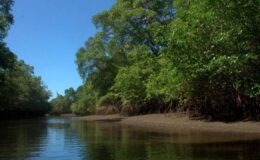Environmental numbers reveal bleak outlook for island territory.
- By : James Bryson
- Category : Conservation, Environmental, World Events

While the Panamanian indigenous Ocelot is benefiting areas of the jungle by eating invading rodents, the rest of the world is continuing to wipeout wildlife. This article explains, as is the case with the Seychelles, what effect climate change will have on small islands in the global south. And in doing so, the wildlife and flora and fauna that Earth will lose.
The IPCC also highlights the inequality in terms of ability to resist the effects of climate change
Up to 48% of terrestrial animal and plant species are at high risk of extinction due to climate change, a problem that already affects half of the world’s population, especially in the global south and on small islands, according to a report from the ONU.
The new evaluation report on adaptation, impacts and vulnerability to global warming, published this Monday by the Intergovernmental Panel of Experts on Climate Change (IPCC), indicates that, if the average temperature of the planet reaches 5 ºC in 2100 by above pre-industrial levels, up to 48% of species may become extinct.
In the best case scenario, if the international community succeeds in containing warming below the 1.5°C threshold by the end of the century – a limit that the IPCC predicts will be exceeded before 2040 if no stronger action is taken to cut emissions of greenhouse gases – the number of terrestrial species at high risk of becoming extinct would reach 18%.
The document updates in more than 3,500 pages what the international scientific community knows about the climate challenge with respect to 2014 and concludes that there are irreversible changes that have already occurred and “points of no return” that are approaching, such as hydrological alterations derived from glacial retreat, or those driven by melting permafrost in some mountain and Arctic ecosystems.
One of the consequences of these changes in the planet’s climate system is coastal flooding, a risk that will increase by 20% if the sea level rises 15cm compared to the current level; that it will double if it rises 75cm and will triple if it reaches 140cm “assuming that neither the population nor the degree of protection change”.
The IPCC also highlights the inequality in terms of ability to resist the effects of climate change and indicates, for example, that between 2010-2020, “human mortality from floods, droughts and storms was 15 times higher in highly vulnerable regions, in comparison with regions of very low vulnerability”.
“Progress is uneven and we are not adapting fast enough,” said scientist Hans-Otto Pörtner, who co-leads the working group in charge of the report along with South African expert Debra Roberts, who has described the document as a wake-up call of the reality that he hopes will generate the “response we need from society”.
IPCC specialists warn about the “window of opportunity” that “is closing” to act against climate change, a problem to which between 3,300 and 3,600 million people are already “highly vulnerable.”
It is estimated that the world has already lost 5% of agricultural productivity as a result of climate change, and that approximately half of the population currently suffers from “severe” water scarcity during at least one period of the year, risks that will worsen as as temperatures rise and will undermine the food security, health and economy of millions of people.
“We are in an emergency on the way to disaster,” said the director of the International Union for Conservation of Nature, who has highlighted the role of biodiversity in curbing global warming and dealing with climate impacts: “nature can be our savior But first we have to save her.”
The UN Secretary General, António Guterres, has described the report as “an atlas of human suffering and an accusation that points to the failed leadership on climate issues”, and has stressed that the “abandonment of leadership is a crime”.
“I have seen many scientific reports during my career, but none like this one,” Guterres lamented, recalling that while science says that to meet the challenge, the world must reduce emissions by 45% by 2030 and achieve carbon neutrality. in 2050, “in light of current commitments, global emissions will increase by almost 14% in the current decade”, which will mean “a catastrophe”.
Any delay in taking “transformative” actions to mitigate global warming and alleviate climate threats – more frequent and severe extreme weather events, prolonged droughts, floods, etc. – “involves deaths,” Guterres stressed, pointing to “the biggest polluters of the world” as those “guilty of burning down the only home we have”.



No Comments